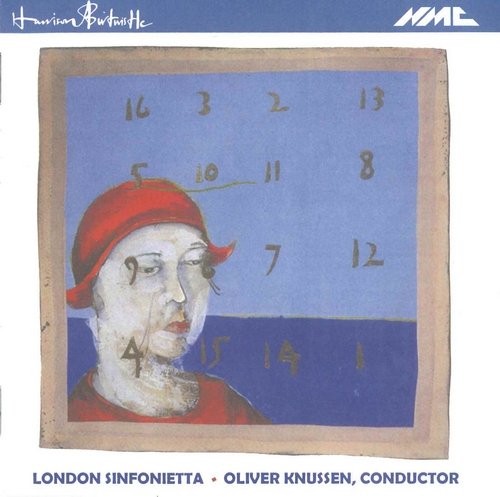
London Sinfonietta, Oliver Knussen - Harrison Birtwistle: Melencolia I, Ritual Fragment, Meridian (1993)
BAND/ARTIST: London Sinfonietta, Oliver Knussen
- Title: Harrison Birtwistle: Melencolia I, Ritual Fragment, Meridian
- Year Of Release: 1993
- Label: NMC
- Genre: Classical
- Quality: FLAC (image+.cue,log,scans)
- Total Time: 01:03:20
- Total Size: 221 Mb
- WebSite: Album Preview
Tracklist:
[1]-[5] Melencolia I
[6] Ritual Fragment
[7]-[16] Meridian
Performers:
London Sinfonietta with
Oliver Knussen — conductor [1]-[5], [7]-[16]
Antony Pay — clarinet [1]-[5]
Helen Tunstall — harp [1]-[5]
Mary King — mezzo-soprano [7]-[16]
Michael Thompson — horn [7]-[16]
Christopher van Kampen — cello [7]-[16]
London Sinfonietta Voices [7]-[16]
[1]-[5] Melencolia I
[6] Ritual Fragment
[7]-[16] Meridian
Performers:
London Sinfonietta with
Oliver Knussen — conductor [1]-[5], [7]-[16]
Antony Pay — clarinet [1]-[5]
Helen Tunstall — harp [1]-[5]
Mary King — mezzo-soprano [7]-[16]
Michael Thompson — horn [7]-[16]
Christopher van Kampen — cello [7]-[16]
London Sinfonietta Voices [7]-[16]
All three works on this disc are essential Birtwistle. Oliver Knussen is one of best conductors in the world. The London Sinfonietta needs no introduction. And NMC is one of the great independent labels. What else do you need?
Well, I know Birtwistle's music alienates some people, and in its way it is more radical than anything 50/60s Darmstadt serialism could offer. But it is perhaps also the most interesting, often in a extra-musical way.
Birtwistle seems to engage with forgotten areas of history (both musical and cultural, especially that of Britain). He makes history seem a strange, different, and incomprehensible world; he stresses its difference, and thus makes us re-exmaine our current position and cultural acrtivity. Like Stravinsky's Agon, his music problematises a notion of linear and progressive development. It is a critique of the rationalism and humanism of the Modern world, and the goal-orientated music that 'accompanied' it. Witness his interogation of pulse and clock time in Silbury Air (on Etcetera), narrative and the idea of character in the Mask of Orpheus (NMC), and his privileging of the sensous, pre-rational world of Archaic/early Classical Greece (eg, Tragoedia (Decca Britain)).
It is primeval music, yet could not have been written at any other time. In a cultural, not musical, sense, it perhaps exhibits, at the very least lays the foundations for, a radical postmodernity (Musical discussion of the modern and postmodern seems to revolve around whether so-and-so's music has a melody or not!)
The best description for a lot of his music is probably Mechanical Pastoral. Both modern and old, simple yet ellusive, robotic but sadly human, intergorrative and submissive, foreign yet instantly recognisable, his is the music I often have to struggle with the most to begin to comprehend. I don't understand the half of it, but that's what I love about it.
Well, I know Birtwistle's music alienates some people, and in its way it is more radical than anything 50/60s Darmstadt serialism could offer. But it is perhaps also the most interesting, often in a extra-musical way.
Birtwistle seems to engage with forgotten areas of history (both musical and cultural, especially that of Britain). He makes history seem a strange, different, and incomprehensible world; he stresses its difference, and thus makes us re-exmaine our current position and cultural acrtivity. Like Stravinsky's Agon, his music problematises a notion of linear and progressive development. It is a critique of the rationalism and humanism of the Modern world, and the goal-orientated music that 'accompanied' it. Witness his interogation of pulse and clock time in Silbury Air (on Etcetera), narrative and the idea of character in the Mask of Orpheus (NMC), and his privileging of the sensous, pre-rational world of Archaic/early Classical Greece (eg, Tragoedia (Decca Britain)).
It is primeval music, yet could not have been written at any other time. In a cultural, not musical, sense, it perhaps exhibits, at the very least lays the foundations for, a radical postmodernity (Musical discussion of the modern and postmodern seems to revolve around whether so-and-so's music has a melody or not!)
The best description for a lot of his music is probably Mechanical Pastoral. Both modern and old, simple yet ellusive, robotic but sadly human, intergorrative and submissive, foreign yet instantly recognisable, his is the music I often have to struggle with the most to begin to comprehend. I don't understand the half of it, but that's what I love about it.
DOWNLOAD FROM ISRA.CLOUD
London_Sinfonietta_Oliver_Knussen_Harrison_Birtwistle_93_0410.rar (221.35 MB)
London_Sinfonietta_Oliver_Knussen_Harrison_Birtwistle_93_0410.rar (221.35 MB)
Classical | FLAC / APE | CD-Rip
As a ISRA.CLOUD's PREMIUM member you will have the following benefits:
- Unlimited high speed downloads
- Download directly without waiting time
- Unlimited parallel downloads
- Support for download accelerators
- No advertising
- Resume broken downloads


